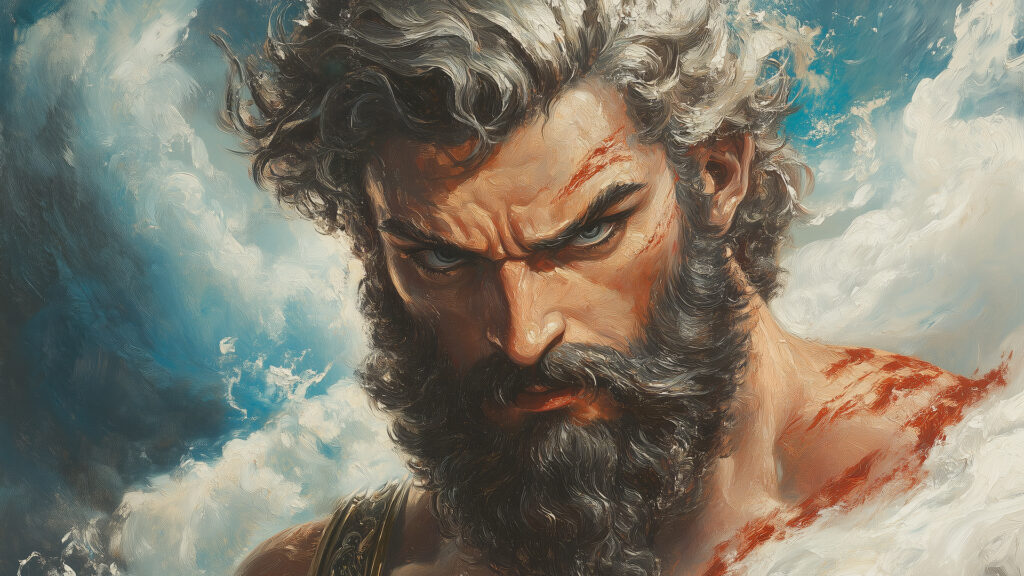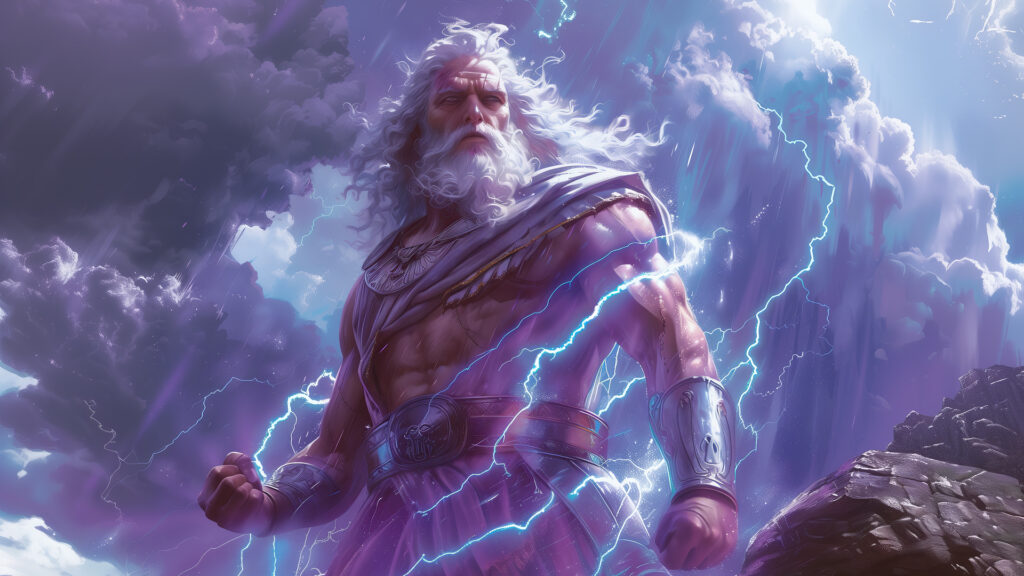Introduction
Let’s answer the question: “Who is Zeus in Greek mythology?” Zeus stands as the king of the gods and holds a significant place in Greek mythology. Born to the Titans Cronus and Rhea, Zeus faced challenges but ultimately became a mighty ruler of Mount Olympus.
In this article, we will explore Zeus’s early life, his epic battles, his role in the world, and his complex relationships with his family.
Birth and Early Life
Zeus was born to Cronus and Rhea, the Titans who ruled before the Olympian gods. Cronus feared a prophecy stating that one of his children would overthrow him. To prevent this, he swallowed each of his kids as soon as they were born. Rhea, heartbroken over losing her children, saved Zeus by hiding him on the island of Crete. She wrapped a stone in blankets and gave it to Cronus, tricking him into thinking it was the newborn Zeus.
As Zeus grew on Crete, nymphs Adrasteia and Ida cared for him, feeding him honey and milk. When he became old enough, he decided to rescue his siblings. With help from Metis, a wise goddess, he made Cronus vomit up his brothers and sisters: Poseidon, Hades, Hera, Demeter, and Hestia.

Image by MythologyArt via Pixabay (Pixabay Content License).
Titanomachy (Battle of the Titans)
After rescuing his siblings, Zeus gathered them to confront Cronus and the Titans in a fierce battle known as the Titanomachy. This term literally means “battle of the Titans.” With help from the Cyclopes, one-eyed giants known for their strength and craftsmanship, and the Hecatoncheires, giant beings with a hundred arms, Zeus and his siblings fought against their father and the Titans. The Cyclopes provided Zeus with his famous thunderbolt, a powerful weapon that allowed him to strike down enemies. The Hecatoncheires fought fiercely, hurling massive boulders and attacking multiple foes. Together, these allies played crucial roles in the overthrow of Cronus.
After ten long years of war, Zeus and his allies emerged victorious, casting the defeated Titans into Tartarus, a deep abyss used for punishment. This imprisonment marked the end of the Titans’ reign.
Following this victory, Zeus became the king of the gods and ruled from Mount Olympus, overseeing the sky. Poseidon took control of the sea, while Hades became the lord of the Underworld. Hera was named the queen of the gods, taking care of marriage and family. Hestia represented home and warmth, and Demeter looked after farming. The new order of the Olympian gods secured their rule over both the heavens and the earth.

Image by MythologyArt via Pixabay (Pixabay Content License).
Zeus’s Role in Greek Mythology
Zeus, the king of the gods, controls the sky and thunder. He lived on Mount Olympus, the tallest mountain in Greece, and carried a powerful lightning bolt to demonstrate his strength. As the ruler of the gods, he aimed to maintain fairness among both gods and humans. Zeus often intervened to help solve problems, showing he cared for both gods and people.
People worshipped Zeus in many ways, believing he controlled the weather. They built grand temples in his honor, like the famous Temple of Zeus at Olympia, which housed a massive statue made of gold and ivory, one of the Seven Wonders of the Ancient World. Festivals like the Olympic Games celebrated Zeus with sports competitions and sacrifices as people prayed for good weather, safety, and success.

Image by MythologyArt via Pixabay (Pixabay Content License).
Zeus and His Divine Family
Zeus is one of the children of the Titans Cronus and Rhea. His siblings include Poseidon, the god of the sea, Hades, the lord of the Underworld, Hera, the goddess of marriage and his wife, Demeter, the goddess of agriculture, and Hestia, the goddess of the hearth.
Zeus’s relationship with Hera was complicated given his many affairs with other goddesses and mortal women. This fueled Hera’s jealousy and often drove her to seek revenge against Zeus’s lovers and their children. As the goddess of marriage, she took her role seriously, and Zeus’s betrayals threatened the institution she protected. Together, Zeus and Hera had several children, including Ares, the god of war, and Hebe, the goddess of youth.
In addition to his marriage, Zeus had many romantic adventures. One important relationship was with Leto, a Titaness, who became the mother of twins Apollo and Artemis. Apollo is known as the god of the sun and music, while Artemis is the goddess of the hunt. Zeus also had a relationship with Maia, one of the Pleiades, who gave birth to Hermes, the clever messenger god. Zeus tricked a woman named Alcmene into thinking he was her husband, leading to the birth of Heracles (Hercules), a famous hero known for his strength. He also had a son named Dionysus with a mortal woman named Semele, who died after seeing Zeus in his true form. Overall, Zeus is believed to have fathered around 50 to over 100 children.

Image by wallner via Pixabay (Pixabay Content License).
Conclusion
Thanks for reading this article! We hope you found the information helpful and that it answered your questions. You can take a fun quiz to test what you’ve just learned, so give it a try!
We would also love to hear your thoughts. What do you find most fascinating about Zeus, and which of his stories stands out to you the most? Please share your comments below.
And remember, there’s plenty more content on Huxeo for you to explore and discover. Check it out and see all the great material waiting for you!



1 Comment
Great read, I definitely learned a lot! 😀